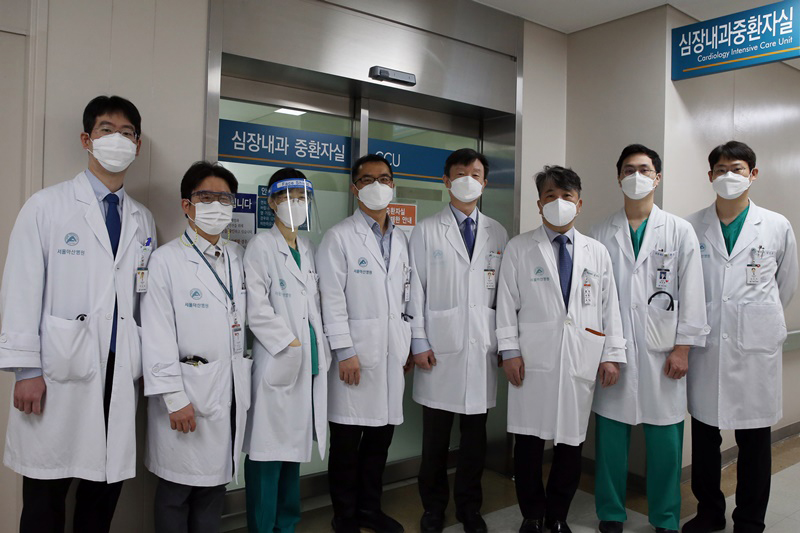
New Life to 800 Patients with End-Stage Heart Failure... High Survival Rates of 95%

The photo shows (from left) Professor Sang-un Lee of Cardiology, Professors Chun-soo Park and Bo-sang Kwon of Pediatric Cardiac Surgery,
Professor Sung-ho Jung of Thoracic and Cardiovascular Surgery, Professor Jae-joong Kim of Cardiology,
Professor Tae-jin Yun of Pediatric Cardiac Surgery, and Specialist Junho Hyun and Professor Min-seok Kim of Cardiology.
AMC became the first hospital in Korea to perform 800 heart transplants with the successful completion of a heart transplantation on ECMO-reliant Kim (male, 40) by the heart transplantation team of the Organ Transplantation Center. Having achieved this record after reaching the 700 surgeries milestone in September 2018, this once again proves the excellence of AMC’s cardiac transplantation system and severe patient care.
Since Korea’s first heart transplantation in November 1992 on a 50-year-old woman suffering from end-stage heart failure caused by dilated cardiomyopathy, the heart transplantation team has given life to 800 patients with end-stage heart failure. Surgeries for dilated cardiomyopathy with weakened heart muscles and failing heart accounted for 60% of the overall 800 cases, while those for congenital cardiac disorders accounted for about 11%. In other cases, patients were forced to undergo heart transplantation because ischemic cardiomyopathy caused by coronary artery disorders or a congenital heart defect had led to end-stage heart failure.
The heart transplantation team boasts the highest survival rates not only in Asia but also in the world. The one-year, five-year, and ten-year survival rates are 95%, 86%, and 76%, respectively. The figures outstrip the rates of 81% (one-year), 69% (five-year), and 52% (ten-year) published by the International Society for Heart and Lung Transplantation and are comparable to those of the world’s leading heart transplantation centers such as Stanford University Medical Center of the U.S.
Patients with end-stage heart failure have to keep waiting for heart transplantation, as it is only possible with brain death donations. If the wait lasts longer, conditions will become aggravated, and the patient will have to require mechanical circulatory support (MCS) to survive until a donor heart is available. In worst cases, other organs will fail, and the systemic health status will deteriorate; thus, the prognosis of heart transplantation may become negative or the transplant itself will become impossible.
To deal with this delay, the heart transplantation team, based on their experience in treating patients with heart failure and knowledge of heart transplants, implants a ventricular assist device. The ventricular assist device safely supports patients awaiting transplant until the heart transplant or is used as a permanent treatment for patients with end-stage heart failure for whom the option of heart transplantation is available.
The Director of the Heart Failure and Cardiac Transplantation Center, Sung-ho Jung (Professor of Thoracic and Cardiovascular Surgery) said, “Heart transplantation in Korea have reached a fairly advanced level as evidenced by postoperative survival rates, but due to the shortage of organ donors, many patients with end-stage heart failure are still suffering. As heart transplant relies mostly on brain death donations, I hope more people are encouraged to donate their organs.”
It was the medical specialists’ tireless efforts and organic teamwork with other facilities, including the Organ Transplantation Center, that helped the AMC perform 800 heart transplants, the most in Korea, with one of the highest survival rates in the world.
